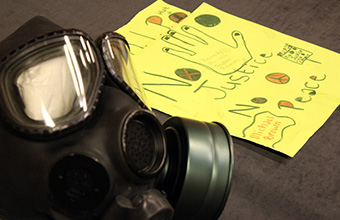College of Arts and Sciences Newsroom

Moral Courage in Ferguson
'Push yourself outside of your comfort zone and ask questions because you may not get the answer you thought. But regardless of what you do get, you'll find truth.' Those are the words of University of Dayton student Francesca Chaba after she returned from a Human Rights Center project May 12-27 in Ferguson, Missouri, to examine, study and collect examples of moral courage.
The group conducted an oral history project, capturing stories of people who participated in and were affected by the 2014 protests after the killing of Michael Brown. The goal was to document people who, despite adversity and risk, "chose to activate their moral courage," according to Joel Pruce, assistant professor of human rights studies who oversaw the project for the University of Dayton Human Rights Center.
The Human Rights Center partnered with PROOF: Media for Social Justice, an organization specializing in visual storytelling for human rights and peacebuilding. The students will present their work at 7:30 p.m. Wednesday, Sept. 28, in Sears Recital Hall. Elizabeth Vega, Chicana artist and Ferguson protester, will be the featured speaker. The event is free and open to the public.
"We will explore how testimony provides an entry point for outsiders to understand the experiences of others, bring complex events into focus and forge relationships of solidarity," Pruce said. "We also will show the connection of events like Ferguson to human rights atrocities around the world, specifically the 43 disappeared students of Ayotzinapa, Mexico, an incident that marks its 2-year anniversary this month." Vega worked directly with families of the disappeared while conducting solidarity actions in Ferguson.
Darren Seals, aka King D Seals, was among those who spoke to the University of Dayton when they visited Ferguson. A local artist, organizer and activist during the Ferguson protests, Seals spoke passionately about his love for his community and city, Pruce said. He shared the struggles of growing up in North City St. Louis and his dream of one day opening a center for the children of Ferguson.
"I mostly rely on my will and my belief in myself, what I believe I can do...I'm a man, like, I'm gonna die by that... Because I can't live on my knees praying for someone to help me — I can get up on my feet and help myself...I believe in myself and I believe in my people and I guess that could be considered a faith," Seals told the group.
Seals was found shot dead in a burning car Sept. 6.
"This is real life. You can't get this in a classroom in Dayton, Ohio. This is why it's so important to go into the field, to hear the stories of the people taking up their human rights struggle," Pruce said. "At the event, we will discuss how we can ground these lessons in our everyday lives on campus, in class and other settings."
One of the things the group found in talking with Brittany Packnett, executive director of Teach For America-St. Louis who has served on the Ferguson Commission and the President's Task Force on 21st Century Policing, was her perspective that before Brown's death "all the things black people talked about at our kitchen tables and barber shops and beauty shops that we knew to be true…were just like our dirty little secret.
"The dirty little secret got exposed, right, and so I think our problem is that we, like every other American city, we're deeply rooted in issues of race, class, privilege and oppression but never ever were forced to face them, until, like in a real way, until 2014."
Bradley Petrella, another student on the trip, believes Michael Brown's death may prove to be a catalyst that opens a conversation around Ferguson's "dirty little secret."
"Since I spoke with so many people intent on making a difference since Michael Brown was killed, I believe his death will instigate change," Petrella said. "By bringing the issues of policing and institutional racism to the national spotlight and spurring already tangible changes in Ferguson with organizations like Chosen for Change and The Michael O.D. Brown We Love Our Sons & Daughters Foundation and elections of new city council members, Brown’s killing has certainly not been in vain."
To learn more about the University of Dayton Human Rights Center's project in Ferguson, Missouri, visit the related links.
- For more information, contact Shawn Robinson, associate director of media relations, at 937-229-3391 or srobinson1@udayton.edu.
